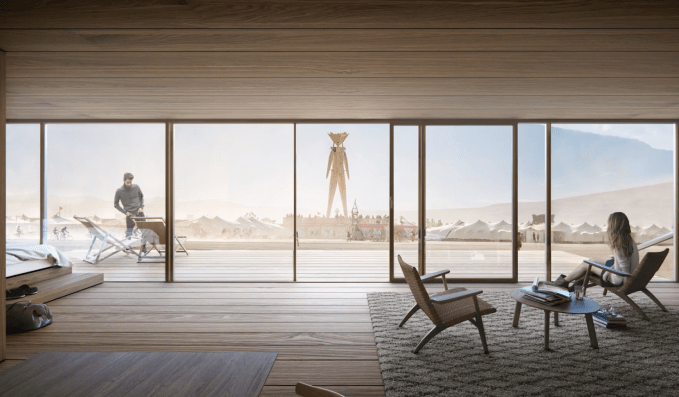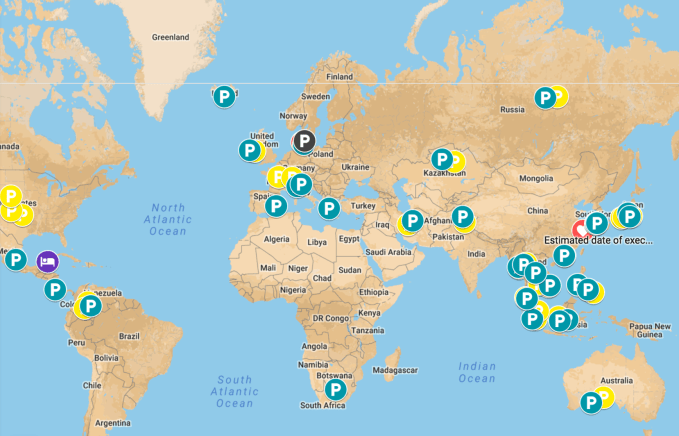Poshtel launches an international network of luxe pop-up shipping container suites

Launching on the Disrupt 2017 Startup Battlefield stage, the Danish startup Poshtel is really, really into shipping containers. And with good reason. The modular, industrial train car-esque structures are a versatile idea for the near future of housing, from providing permanent homes for the houseless to giving backpackers on a budget somewhere to crash for a night.
While Poshtel sounds interested in both ends of that spectrum, it intends to start with the latter. The company will launch as “a chain of designer suites available for rent through Airbnb” but the company characterizes its interests as a “movement” more than just a vacation rental engine.
As you can see in its launch video, the company’s ambitions are myriad:
“What if buildings could simply pop up where you needed them? What if a city was never more than a month away from solving a housing crisis? What if a vacant lot could be turned into a designer hotel overnight? What if you could suddenly live where no one has lived before?”
Poshtel was founded by Morten Lund (CMO), Søren Henningsen (CFO) and O Koo (CEO) and has raised $500,000 to date with from Bjarke Ingels, famed tech industry architect and founder of the Bjarke Ingels Group, co-founder Morten Lund and Vagn Sørensen, Chairman Scandic Hotels. You may have heard of Lund, an experienced serial entrepreneur who managed to turn an early $50,000 investment in Skype into $50 million when Ebay purchased the company in 2005. (He later lost it, but he’s got a good comeback story.)
“The first set of products that we’re launching is a little bit more along the luxury line,” Koo explained to TechCrunch, describing the “low income perspective” and “housing perspective” as a second phase. “We wanted to prove our first model first.” The luxury-first model for a project like this makes sense, and given the team’s experience with housing it sounds like that interest won’t fade as it moves into its first phase. “Our technical engineering team has actually done projects related to low income housing,” Koo said. “There’s nothing new… it’s the execution we’re providing and the business model.”

And while one of its promo images of a sweater-clad guy looking out into Burning Man’s Playa reveals its immediate target demographic, in truth, tiny homes are a compelling short term answer to houselessness — or at least a very meaningful stopgap. Earlier this year in Orange County, a 16-unit shipping container complex called Potters Lane opened to house homeless veterans. Cities like Portland, Oregon are experimenting with tiny homes already. In Portland, an innovative pilot program offers homeowners willing to house a homeless family for five years a tax abatement and a tiny house on their property, which they would then own and be able to rent out after the period ends.
As the company explains, “a popup hostel is assembled, transported, placed and installed, then it is rented out.” Poshtel would oversee this network of pop-up shipping containers that theoretically could move around wherever a landowner or a city needed them to go. Poshtel’s intention to leave no footprint whatsoever likely underestimates humanity’s ability to sully anything it touches, but its structures will be wholly up-cyclable and ready to move on to new locations if their time in one spot is up. The company uses eco-friendly designs and materials and will stock its structures with sustainable products local to the region they are placed in.

The company’s slick concept designs show that one service structure, internally known as the “fifth element,” that could power ten Poshtel units with electricity, water, sewage and wifi. While most Poshtel units might remain off the grid, others could hook into government-provided services to simplify things. The idea is scalable in a very architecture-nerd way: one unit can stand alone as a “PopUp Unit,” but 10 makes it a PopUp “Village,” while more than 100 units is a configuration that Poshtel deems “Poshtel Living.” If you’re a sucker for minimalist concept designs, you’ll have a field day with their prototypes. And while many gorgeous concepts have little shot at being translated into reality, Poshtel is already digging into the partnership and logistical aspects of its system of structures right down to less glamorous questions like “where does the sewage go?”
Regulations and logistics could slow Poshtel’s multi-pronged roadmap down considerably, but they’re tackling that challenge in a realistic way. “We’ve had this idea actually for three or four years…. we couldn’t get over the hurdle in how to do this,” Koo said. After the “realization that we had to have local partners all around the world” overcoming those regulatory hurdles in a way that might work for both Poshtel and its partners seemed possible. “We find landowners around the world [and] split the profits 50/50,” Hoo said. Those partners are expected to liaise with local governments. The company is already in talks with the Chinese government over land that it owns over how Poshtel could create jobs where they are needed while providing housing.
Right now, the 15-person company is already working with landowners in Copenhagen (2 complexed of 100 units), Berlin (one complex of 50 units), Thailand (one complex of 50 units), and some smaller plots in Lisbon, Greece, Colombia, Italy and Ibiza. The company is working on franchise deals in Singapore, Malaysia, Indonesia, Thailand, Korea, Japan, Denmark, Portugal and Lebanon.
The vision is well underway. Poshtel has one operational structure in Copenhagen right now and 20 more under construction to launch in January 2018.

The concept of a “poshtel” — a portmanteau of “posh” and “hostel” — appears to have bubbled up around 2015 and is to a hostel what glamping is to camping. The idea is a kind of boutique hostel that ups the game for travelers beyond bare bones dorm-style lodging, offering something that feels unique and comfortable while remaining well below rates of more luxury-oriented bookings. As a traveler myself, I will say that the sweet spot between a hostel and a boutique hotel is often where I’ve found the best value and these kinds of spaces tend to feel connected to their communities without the horrors of cramming 25 drunk co-eds into rickety bunk beds. Poshtel’s immediate vision, the one that will launch on Airbnb, indeed seems oriented toward the lowercase version of a poshtel. And yes, it’s silly name for an often pretty utilitarian way of traveling.
With low-end luxury rentals and a design-first mentality, Poshtel is starting in a very startuppy place. Still, the company’s more humanitarian and civic-minded ideas don’t seem out of the question given its realism and concern for detail. Small houses, big dreams.
Battlefield Judge Q& A:
Q: How does it work? Do you sell units?
“We actually don’t sell our units, we work with the landowners. we don’t want to go around municipalities and governments.
“It’s very low risk for the landowners” as Poshtel handles the construction and maintenance.
Q: I assume its pretty high capital?
A: “It is pretty high capital. The Danish government actually has a pretty good offering for us in terms of financing.”
Q: What is the cost per unit?
A: “Our cost structure is going to be $200 on average [per night] for housing. But that houses a family of four.”
Q: What is success, what is the problem you’re solving?
A: “… The hotel industry does a lot of damage to the environment… the amount of resources that’s required to power these [hotels] are intense. For us, we are able to integrate the land with the units.”
Q: “How long did landowner agreements take to negotiate?”
A: “The land agreement… was fairly quick. When we started this project 7 months ago…. some developers actually don’t know what to do with land. And they like it because we’re actually financing construction [and maintenance]. It’s on them to actually get the permits. [It varies] but it’s going to take about five months to get all of the permits completed.”
“It’s going to be government regulated. Each country is very different.”
Q: Have you guys thought about a system of Poshtel that works in dense urban environments?
A: “A couple of areas we’ll probably go into in the future is student housing and potentially low income housing. We’ve also thought about disaster relief for this particular off the grid utility. We can pop it in and provide fresh water.”
Q: How does booking work?
A: “We haven’t opened it up for booking yet. We have another 25 units that are going to go live in Denmark by the end of the year.”
Q: How temporary is temporary?
A: “For us, the longer the better with the landowners. As long as we’re not impacting the environment I think we could do 7 years, 10 years.”